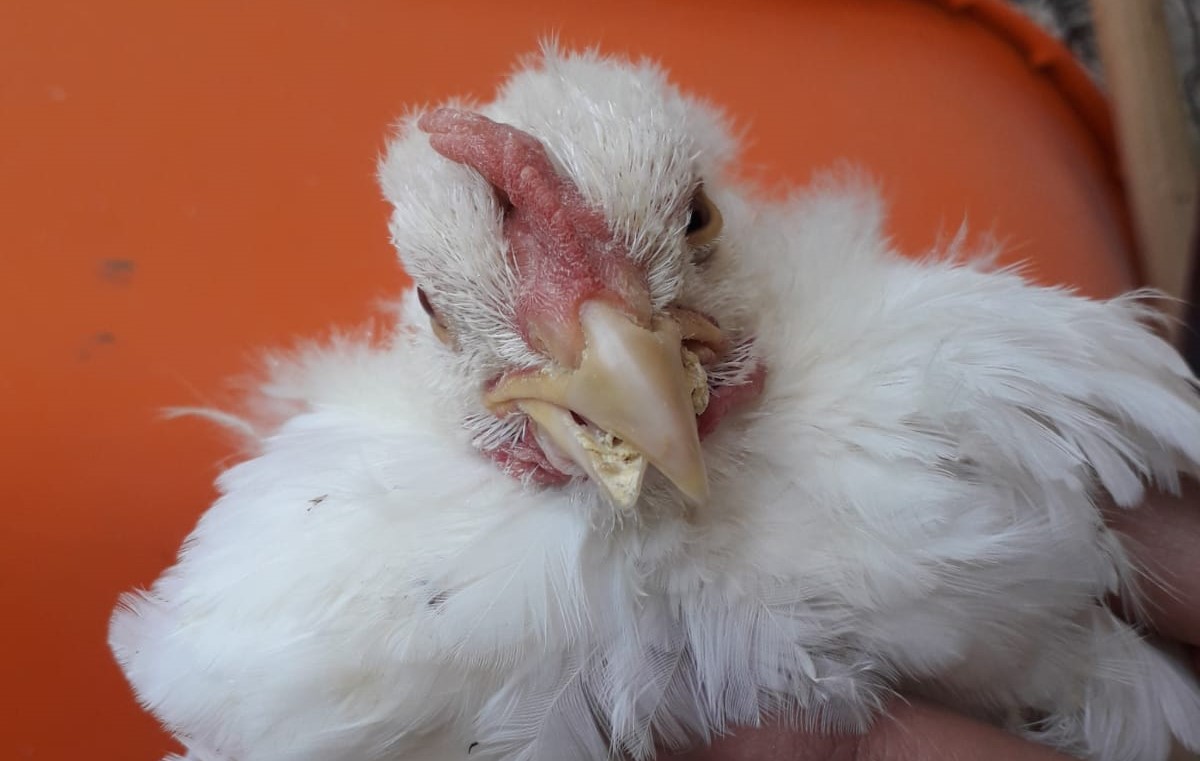Mycotoxicosis caused by the combination of aflatoxin and fumonisin in broiler chickens: a clinical case
Keywords:
fungi in feed, aflatoxins in feed, fumonisin, aflatoxinAbstract
A poisoning occurred in Ross line broiler chicken during a palatability test with cactus fiber as an additive. A group of 100 broilers was divided into four subgroups of 25 to add 0, 100, 200 and 400 mg/kg of fiber per kg of feed. In the second week the birds show differences in size, ruffled plumage, cannot walk, birds in lateral and dorsal recumbency, pedaling, lethargy, ataxia, tremors, pale skin and mucous membranes, cyanosis in crest and chin, variable mortality between groups but birds that received 400 mg/kg of fiber showed fewer signs. In the necropsy there are no findings, studies are carried out to rule out Influenza and Newcastle, corn, soybean paste and feed are grown to determine the presence of fungi. At the fifth week the birds have green pasty diarrhea, jaw dislocation, sagging in the beak, frontal and parietal bones of the skull, osteomalacia, discomfort, clicking in bones during handling, blood serum clots, aflatoxin poisoning is diagnosed, Another food is given and the signs slowly disappear. Penicilium, Alternaria and Fusarium spp fungi were identified in food, the content of aflatoxin and fumonisin was 5 and 1.85 parts per billion. It is concluded that the interaction aflatoxin with fumonisin at the doses reported in broiler chickens causes a nervous condition but the signs decrease with 400 mg/kg of cactus fiber in the feed.
http://dx.doi.org/10.21929/abavet2023.29
e2023-9
References
AZCARATE MP, Patriarca A, Terminiello L, Pinto FV. 2008. Alternaria toxins in wheat during the 2004 to 2005 Argentinean harvest. Journal of Food Protection. 71(6):1262-5. https://doi.org/10.4315/0362-028X-71.6.1262
BRAKE J, Hamilton PB, Kittrell. 2000. Effects of the trichothecen micotoxin diacetoxyscirpenol on feed consumption, body weight, and oral lesions of broilers breeders. Poultry Science. 79(6):856-863. https://doi.org/10.1093/ps/79.6.856
BUENO DJ, Salvano M, Silva JO, Gonzales SN, Oliver G. 2001. Micotoxinas: Diagnóstico y prevención en aves de corral. Boletín Micológico. 16:23-26.
https://revistas.uv.cl/index.php/Bolmicol/article/view/457
ROJAS JJ, Chacón CM, Castañeda, Peláez L, Díaz TA. 2021. Cuantificación de aflatoxinas carcinogénicas en alimentos no procesados y su implicación para el consumo en Lima, Perú. Nutrición Hospitalaria. 38(1):146-151.
https://dx.doi.org/10.20960/nh.03240
FERRER M, Manyes L, Mañes J, Meca G. 2015. Influence of prebiotics, probiotics and protein ingredients on mycotoxin bioaccessibility. Food Function. 6(3):987-94. https://doi.org/10.1039/c4fo01140f
FOUAD AM, Ruan D, El-Senousey HK, Chen W, Jiang S, Zheng C. 2019. Harmful effects and control strategies of aflatoxin B1 produced by Aspergillus parasiticus strains on poultry: review. Toxins. 11(176):1-21. https://doi.org/10.3390/toxins11030176
GUERRE P, Travel A, Tardieu D. 2022. Targeted analysis of sphingolipids in turkeys fed fusariotoxins: first evidence of key changes that could help explain their relative resistance to fumonisin toxicity. International Journal of Molecular Sciences. 23(5):2512.
https://doi.org/10.3390/ijms23052512
GUERRERO B, López M. 2015. Generalidades del sistema de la coagulación y pruebas para su estudio. Investigación Clínica. 56(4):432-454.
http://ve.scielo.org/scielo.php?script=sci_arttext&pid=S0535-51332015000400010
HARKAI P, Szabó I, Cserháti M, Krifaton C, Risa A, Radó J, Balazs A, Berta K, Kriszt B. 2016. Biodegradation of aflatoxin B1 and zearalenone by Streptomyces sp. collections. International Biodeterioration and Biodegradetion. 108:48-56.
https://doi.org/10.1016/j.ibiod.2015.12.007
LAI Y, Sun M, He Y, Lei J, Han Y, Wu Y, Bai D, Gou Y, Zhang B. 2022. Mycotoxins binder supplementation alleviates aflatoxin B1 toxic affects on the immune response and intestinal barrier function in broilers. Poultry Science. 101(3):101683.
https://doi.org/10.1016/j.psj.2021.101683
LARA AJ. 2003. Métodos de determinación, identificación y control de micotoxinas en ingredientes para la nutrición animal. Asociación Mexicana de Nutrición Animal. 2(4). https://www.produccionnimal.com.ar/sanidad_intoxicaciones
MURUGESAN GR, Ledoux DR, Naehrer K, Berthiller F, Applegate TJ, Grenier B, Phillips TD, Schatzmayr G. 2015. Prevalence and effects of mycotoxins on poultry health and performance, recent development in mycotoxin counteracting strategies. Poultry Science. 94(6):1298-315. https://doi.org/10.3382/ps/pev075
OCHOA PJC, Hernández MFF, Chico SSA, Uribe SR, Sierra BJ. 2014. Intoxicación por micotoxinas en pollos de engorde: Reporte de caso. Revista CITECSA. 4(7):49-57. https://biblat.unam.mx/hevila/RevistaCITECSA/2014/vol4/no7/6.pdf
Perusia RO, Rodríguez AR. 2001. Micotoxicosis. Revista de Investigaciones del Perú. 12(2):87-116. https://revistasinvestigacion.unmsm.edu.pe/index.php/veterina
ria/article/view/1637/1413
REYNA-SANTAMARÍA L, Basilio-Navarrete A, Martínez-Rojero RD, Casaubon-Huguenin MT. 2016. Comportamiento productivo y toxicosis en pollos de engorde alimentados con aflatoxinas B1, B2 y tres adsorbentes de micotoxinas. Austral Journal of Veterinary Sciences. 48(2):215-222.
https://www.redalyc.org/journal/5017/501752375012/html/
SCHAEFFER JL, Tyczkowski JK, Hamilton PT. 1988. Depletion of oxycarotenoid pigments in chickens and the failure of aflatoxin to alter it. Poultry Science. 67(7):1080-1088. https://doi.org/10.3382/ps.0671080
SWAMY DVM. 2012. Conceptos actualizados de micotoxinas en aves. Alltech Canadá. 50-54. http://bibliotecavirtual.corpmontana.com/bitstream/123456789/2714/1/M003004.pdf
VALERO ZMA, Hawkins CF. 2007. Metabolismo, fuentes endógenas y exógenas de vitamina D. Revista Española de Enfermedades Metabólicas Óseas. 16(4):63-70.
https://doi.org/10.1016/S1132-8460(07)73506-7
WANG E, Norred WP, Bacon CW, Riley RT, Merrill AH. 1991. Inhibition of phingolipid biosynthesis by fumonisins. Implications for diseases associated with Fusarium moniliforme. Journal of Biological Chemistry. 266(22):14486-14490.
https://doi.org/10.1016/S0021-9258(18)98712-0
WANG W, Zhai S, Xia Y, Wang H, Ruan D, Zhou T, Zhu Y, Zhang H, Zhang M, Ye H, Ren W, Yang L. 2019. Ochratoxin A induces liver inflamation: involvement of intestinal microbiota. Microbiome. 7(1):151. https://doi.org/10.1186/s40168-019-0761-z
ZAIN ME. 2011. Impact of mycotoxins on humans and animals. Journal of Saudi Chemical Society. 15(2):129-144. https://doi.org/10.1016/j.jscs.2010.06.006
ZHAI S, Zhu Y, Feng P, Li M, Wang W, Yang L, Yang Y. 2021. Ochratoxin A: its impact on poultry gut health and microbiota, an overview. Poultry Science. 1000 (5):101037



